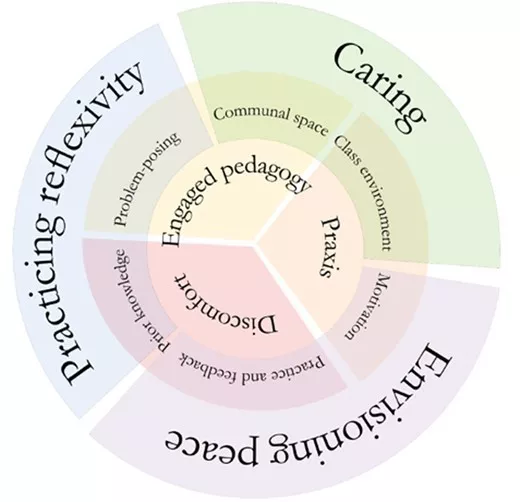Christie Nicoson, Barbara Magalhães Teixeira, and Alva Mårtensson examine an ongoing elective course at the Department, Peace in the 21st Century: Critical Debates on Violence, Justice, and Peace, and present new insights about using critical and engaged pedagogies as a transformative tool in peace and conflict studies classrooms. The case draws critical pedagogies together with the Scholarship of Teaching and Learning to help students not only to learn theory, but also to critically examine their position and everyday experiences in relation to questions of violence, justice, and peace.
Abstract:
Existing studies demonstrate that although peace and conflict studies (PCS) emerged from a deep connection between political activism and research, the field has increasingly moved toward promoting liberal ideals of peace that sustain the status quo. Amidst this trend, many scholars have pushed research and education programs to explore beyond a hegemonic liberal peace, for example by diversifying reading lists and drawing on decolonial frameworks.
This paper adds to such efforts: through the case study of a higher education PCS classroom, we use narratives from two course conveners and a student to explore challenges and opportunities of realizing a critical pedagogy approach to peace education. This approach recenters the classroom not necessarily in terms of what students ought to think, but how; critical theory provides a basis for fostering curiosity, using query as a tool of learning, and focusing class structure on students’ needs.
Our findings suggest that using critical pedagogy in PCS addresses calls for a greater understanding of peace beyond the absence of violence, fosters active envisioning of peace, and works toward decolonizing and demystifying peace work. Ultimately, we call for PCS classrooms to foster critical thinking and radical imagination for a pedagogy of peace praxis.
Read the article here:
Re-Imagining Peace Education: Using Critical Pedagogy as a Transformative Tool
Christie Nicoson, Barbara Magalhães Teixeira, Alva Mårtensson
International Studies Perspectives, ekad023, https://doi.org/10.1093/isp/ekad023


